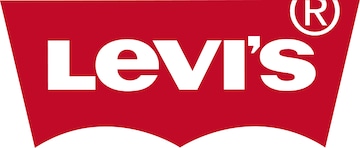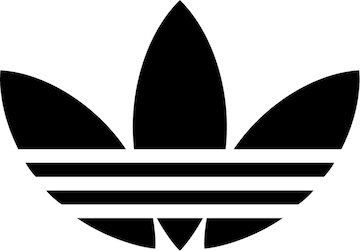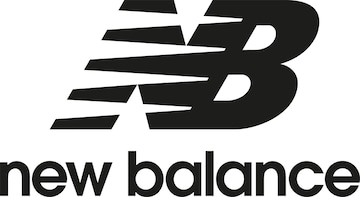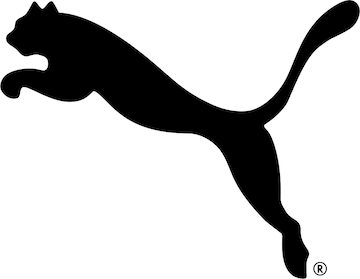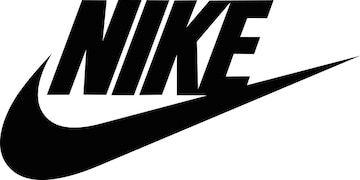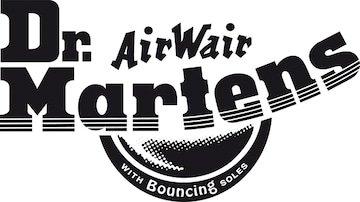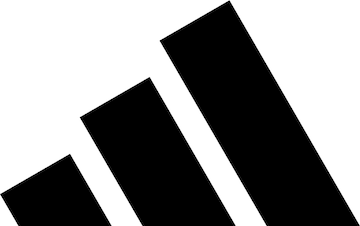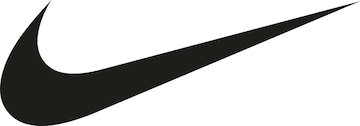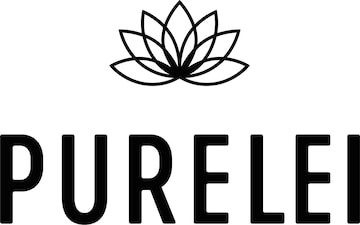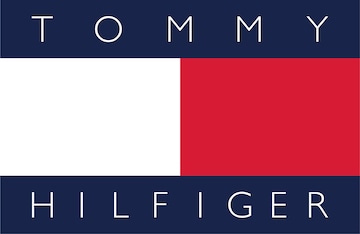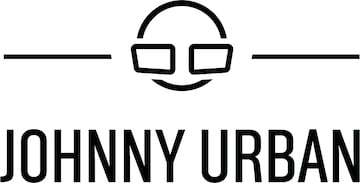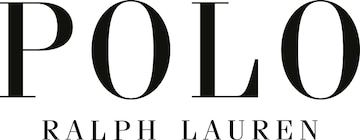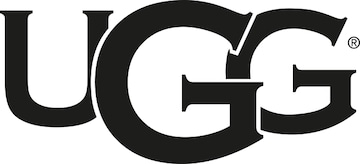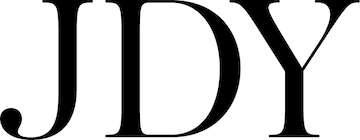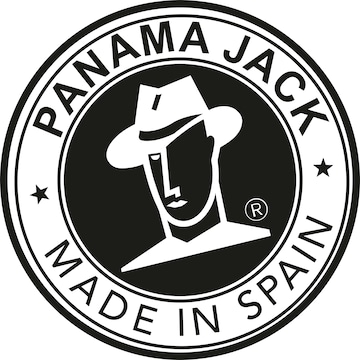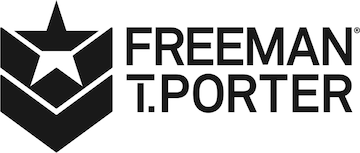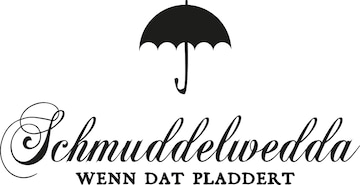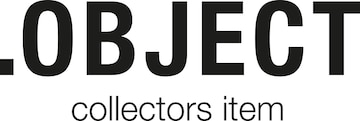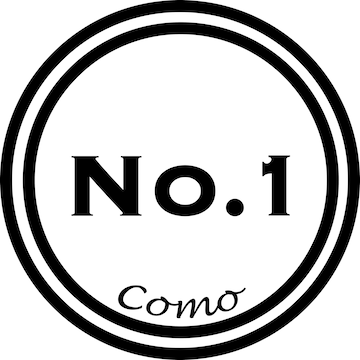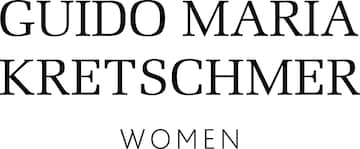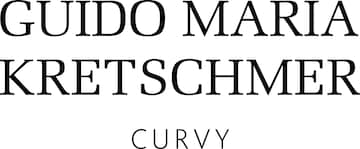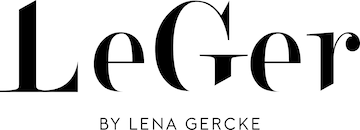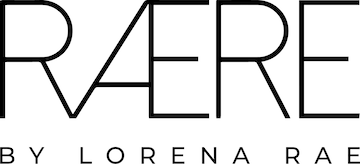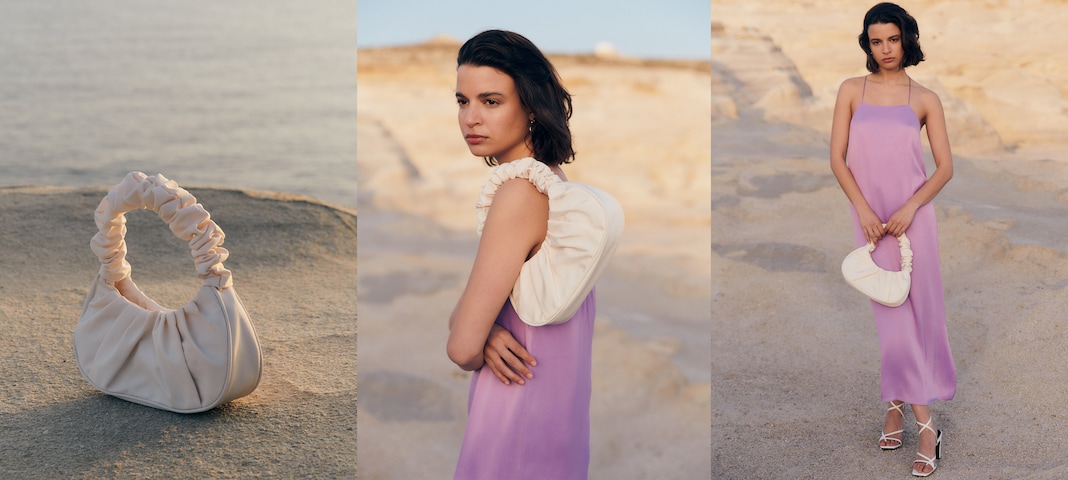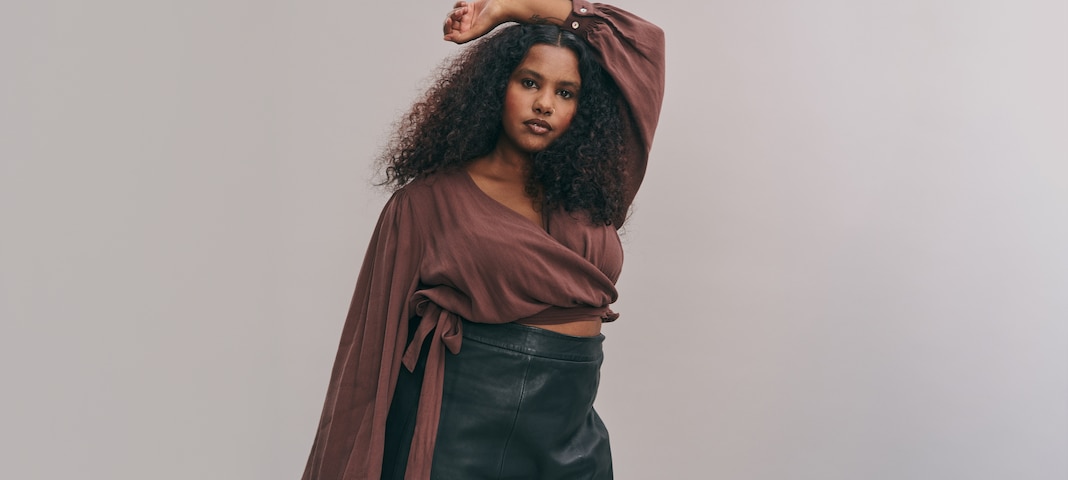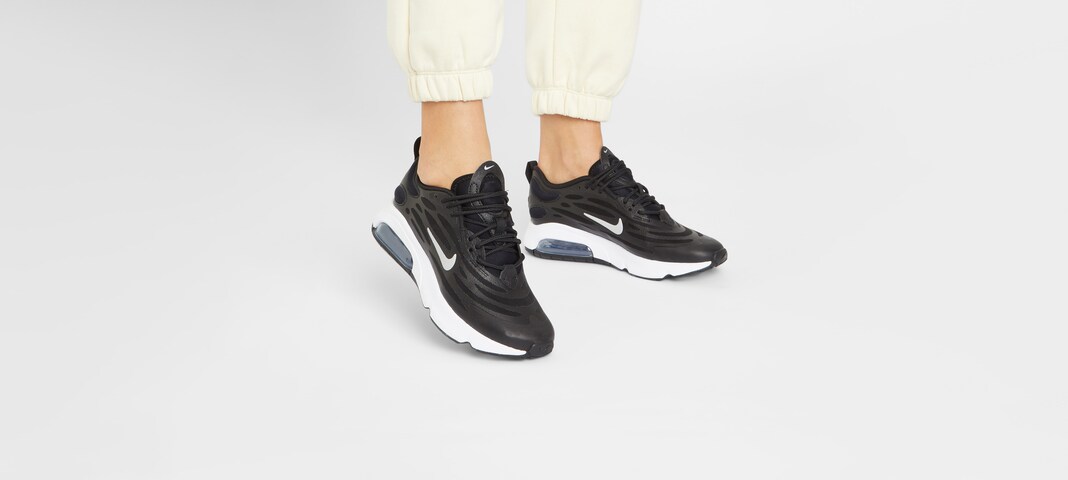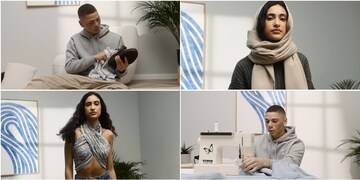التسوق حسب المقاس
التسوق حسب الفئة
أفضل العلامات التجارية
الأبرز
أفضل العلامات التجارية
أفضل العلامات التجارية
أفضل العلامات التجارية


Product Properties
How we communicate more transparently about our products
Dedicated shop features display product information regarding material and production processes along the supply chain of our products. For this communication, we have selected material, third-party standards, and licenses that aim to reduce the effects on the environment.
These include advancements towards the reduction of raw material input, holistic approaches to raw material extraction and innovative product design, improved animal welfare practices, and fibre alternatives.
We intend to increase transparency, and data quality by working closely with our brand partners to enable our customers to make informed shopping decisions.
These include advancements towards the reduction of raw material input, holistic approaches to raw material extraction and innovative product design, improved animal welfare practices, and fibre alternatives.
We intend to increase transparency, and data quality by working closely with our brand partners to enable our customers to make informed shopping decisions.
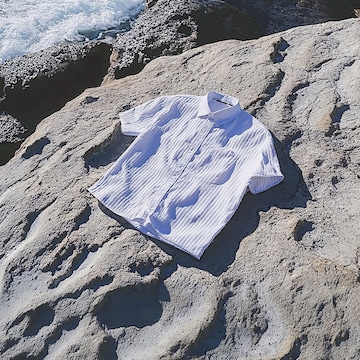
How to find our product property information while shopping
This shows you how to find products with our clustered product properties and where you can find more detailed information on product properties while shopping at ABOUT YOU.
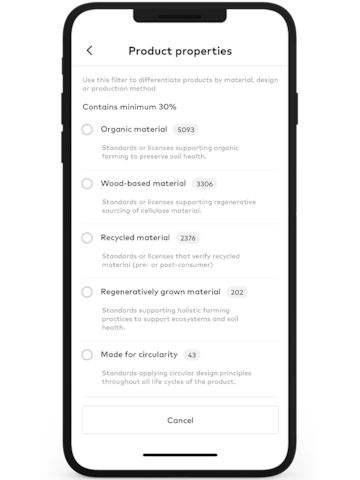
Filter
You can find products with our clustered product properties while shopping by using the filter. By selecting a cluster the filtered view will only show you products that have the respective product properties, licenses, or third-party standards included in the selected cluster.
For guidance on which cluster to select you will find a brief description underneath each cluster.
For guidance on which cluster to select you will find a brief description underneath each cluster.
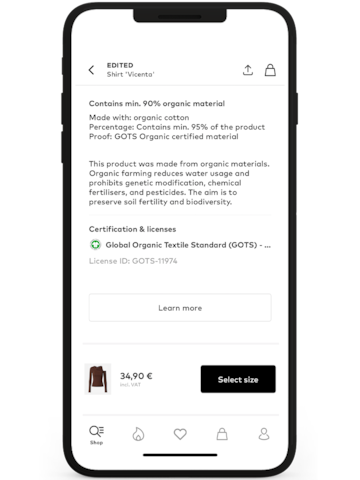
Product detail page
On the product page, you can find more detailed information about the product properties including the specific material, composition, and proof of the assigned cluster. Additionally, you can find third-party certifications and licenses of brands.

Discover our products containing recycled material
Explore our products containing recycled material to find inspiration for new looks and styles.
By choosing products containing recycled materials you can reduce the need for raw materials, avoid waste, and preserve natural resources.
By choosing products containing recycled materials you can reduce the need for raw materials, avoid waste, and preserve natural resources.
The clustered product properties behind our claims:
material, licenses, and third-party standards
material, licenses, and third-party standards
Our clusters offer an overview of different product properties. These consist of materials or third-party standards and licenses, assessing a product and its supply chain.
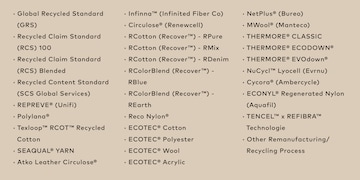
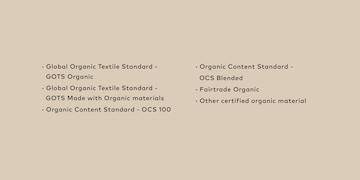

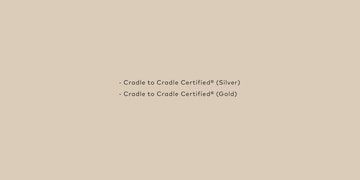
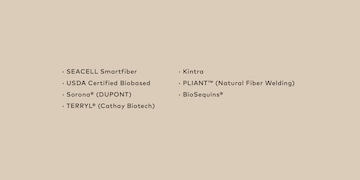
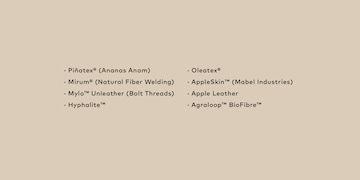
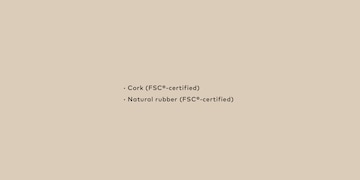
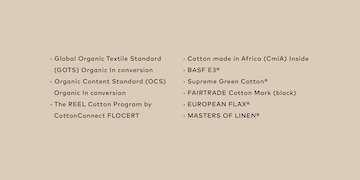
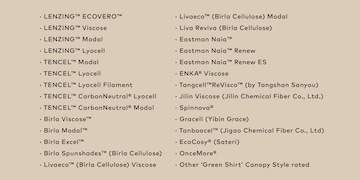
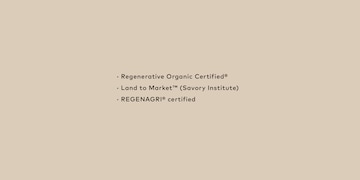
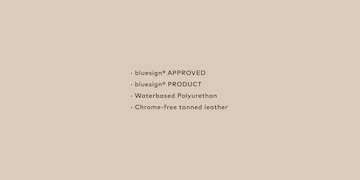
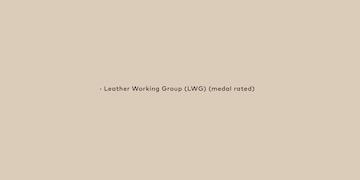
The third-party certifications and licences we display
We display the following third-party certifications and licenses of brands to increase transparency and highlight the independent verification of our brand partner.
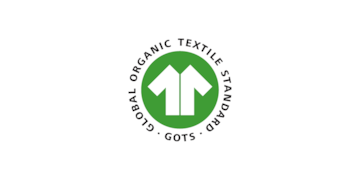
Global Organic Textile Standard - GOTS Organic
The Global Organic Textile Standard (GOTS) is a globally recognized processing standard for textiles made from organic fibres. As part of the certification process, the entire production chain is examined for compliance with environmentally and socially responsible manufacturing requirements. Textile products that contain a minimum of 95% organic fibre can bear the label "GOTS organic".
ABOUT YOU SE & CO. KG is GOTS-certified by ICEA (GOTS-11974). Only the products that carry the GOTS label and claim are certified.
ABOUT YOU SE & CO. KG is GOTS-certified by ICEA (GOTS-11974). Only the products that carry the GOTS label and claim are certified.

Global Organic Textile Standard - GOTS Made with Organic materials
The Global Organic Textile Standard (GOTS) is a globally recognized processing standard for textiles made from organic fibres. As part of the certification process, the entire production chain is examined for compliance with environmentally and socially responsible manufacturing requirements. Textile products that contain a minimum of 70% organic fibre can bear the label "made with organic materials".
ABOUT YOU SE & CO. KG is GOTS-certified by ICEA (GOTS-11974). Only the products that carry the GOTS label and claim are certified.
ABOUT YOU SE & CO. KG is GOTS-certified by ICEA (GOTS-11974). Only the products that carry the GOTS label and claim are certified.
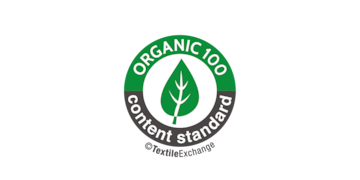
Organic Content Standard - OCS 100
The Organic Content Standard 100 (OCS 100) verifies textile products that contain at least 95% certified organic materials. By checking traceability throughout the entire supply chain, OCS 100 allows for a transparent and independent evaluation and verification of the organic fiber content in a given product.
ABOUT YOU SE & CO. KG is OCS-certified by ICEA (ICEA-TX-3714). Only the products that carry the OCS label and claim are certified.
ABOUT YOU SE & CO. KG is OCS-certified by ICEA (ICEA-TX-3714). Only the products that carry the OCS label and claim are certified.
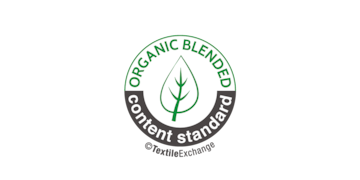
Organic Content Standard - OCS Blended
The Organic Content Standard blended (OCS blended) verifies textile products containing at least 5% certified organic material. By checking traceability throughout the entire supply chain, OCS blended allows for a transparent and independent evaluation and verification of the organic fibre content in a given product.
ABOUT YOU SE & CO. KG is OCS-certified by ICEA (ICEA-TX-3714). Only the products that carry the OCS label and claim are certified.
ABOUT YOU SE & CO. KG is OCS-certified by ICEA (ICEA-TX-3714). Only the products that carry the OCS label and claim are certified.
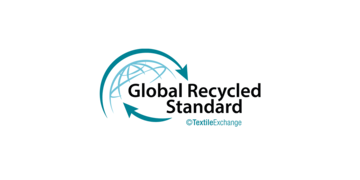
Global Recycled Standard (GRS)
The Global RecycledStandard (GRS) allows the labeling of products that are proven to be made from at least 50% certified recycled content. The goal of GRS is to increase the use of recycled materials and reduce negative impacts from a social, environmental and chemical perspective in production. At the same time, environmentally friendly and socially responsible recycling is to be promoted along the supply chain.
ABOUT YOU SE & CO. KG is GRS certified by ICEA (ICEA-TX-3714). Only the products that carry the GRS label and claim are certified.
ABOUT YOU SE & CO. KG is GRS certified by ICEA (ICEA-TX-3714). Only the products that carry the GRS label and claim are certified.
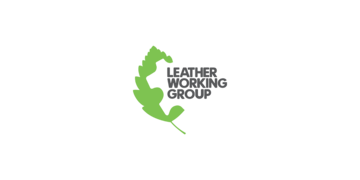
Leather Working Group (LWG)
The Leather Working Group (LWG) is an international, non-profit membership organization made up of over 1600 leather industry stakeholders. The LWG certifies tanneries based on criteria such as water and energy consumption, handling of chemicals, waste and waste water. When you buy this product, you support LWG-certified tanneries.
You have seen 6 out of 15 certifications
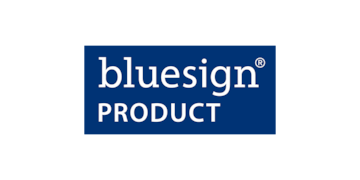
bluesign® PRODUCT
bluesign® PRODUCT stands for textile production with the lowest possible impact on people and the environment, e.g., by limiting the use of chemical substances. It focuses on ensuring consumer safety, workplace safety, and responsible use of resources. Bluesign ® PRODUCT certified products must be processed in certified factories to at least 90%, and at least 30% of the accessories must be bluesign® APPROVED.
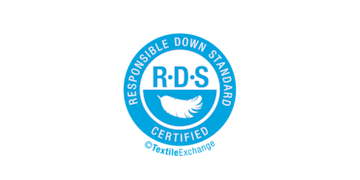
Responsible Down Standard (RDS)
The Responsible Down Standard (RDS) is an exacting standard that certifies the tracking of down and feather products throughout their supply chain. The RDS establishes strict guidelines to ensure the upholding of animal welfare, i.e. in terms of food and water quality, housing, stocking density and outdoor access, animal health and hygiene. Force-feeding and live plucking are also prohibited under the RDS.
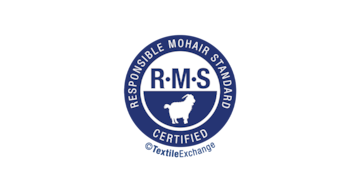
Responsible Mohair Standard (RMS)
The Responsible Mohair Standard (RMS) is a voluntary standard centred around traceability, animal welfare, and environmental responsibility within the supply chain of mohair. The RMS ensures the upholding of the Five Freedoms of Animal Welfare and a strong chain of custody along the supply chain.
ABOUT YOU SE & CO. KG is RMS certified by ICEA (ICEA-TX-3714). Only the products that carry the RMS label and claim are certified.
ABOUT YOU SE & CO. KG is RMS certified by ICEA (ICEA-TX-3714). Only the products that carry the RMS label and claim are certified.
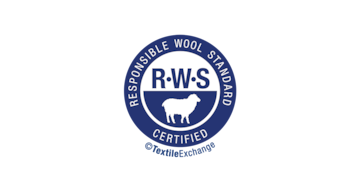
Responsible Wool Standard (RWS)
The Responsible Wool Standard (RWS) is a leading standard for the welfare of animals in the wool industry that guarantees responsible sheep farming. This label addresses animal welfare (e.g. the prohibition of mulesing), sustainable soil management and protection, and full supply chain transparency with an integrated traceability system.
ABOUT YOU SE & CO. KG is RWS certified by ICEA (ICEA-TX-3714). Only the products that carry the RWS label and claim are certified.
ABOUT YOU SE & CO. KG is RWS certified by ICEA (ICEA-TX-3714). Only the products that carry the RWS label and claim are certified.
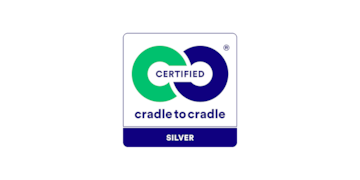
Cradle to Cradle Certified® (Silver)
With the Cradle to Cradle Certified® Products Program, the Institute sets the global standard for safe, recyclable and responsibly manufactured products. Cradle to Cradle Certified® covers the entire value chain and ensures both the positive impact of the products on people and the planet. The product has met at least the Silver requirements in all standard categories.
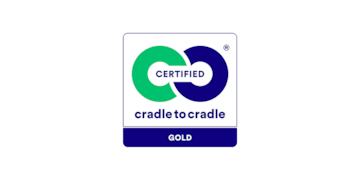
Cradle to Cradle Certified® (Gold)
With the Cradle to Cradle Certified® Product Standard, the Institute sets the global standard for safe, recyclable and responsibly manufactured products. Cradle to Cradle Certified® covers the entire value chain and ensures both the positive impact of the products on people and the planet. The product has met at least the Gold requirements in all standard categories.
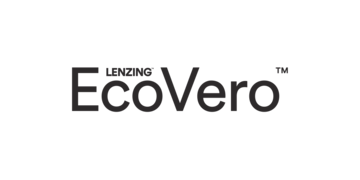
LENZING™ ECOVERO™
LENZING™ ECOVERO™ fibers are made from wood, a natural and renewable raw material carefully sourced from responsibly managed forests. The wood taken from nature is purposefully balanced with forest growth rates, to ensure the continued availability of this valuable resource. LENZING™ and ECOVERO™ are trademarks of Lenzing AG.
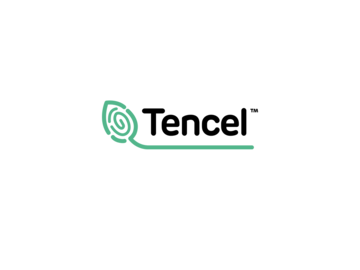
TENCEL™ Lyocell
TENCEL™ Lyocell and Modal fibers are made from wood, a natural and renewable raw material carefully sourced from responsibly managed forests. The wood taken from nature is purposefully balanced with forest growth rates, to ensure the continued availability of this valuable resource. TENCEL™ is a trademark of Lenzing AG.

TENCEL™ Modal
TENCEL™ Lyocell and Modal fibers are made from wood, a natural and renewable raw material carefully sourced from responsibly managed forests. The wood taken from nature is purposefully balanced with forest growth rates, to ensure the continued availability of this valuable resource. TENCEL™ is a trademark of Lenzing AG.
You have seen 15 out of 15 certifications
How to care for your clothes
Making informed choices can go beyond the decision of what to add to your shopping cart. Explore our Love Your Wardrobe page and find out how to care for or reinvent your clothes to extend their life and your time together. Are you ready to take action?
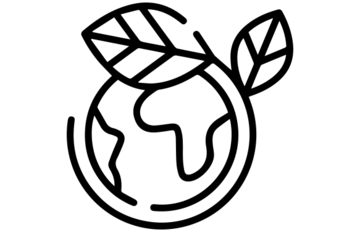 Do you want to learn more about our actions?
Do you want to learn more about our actions? 

